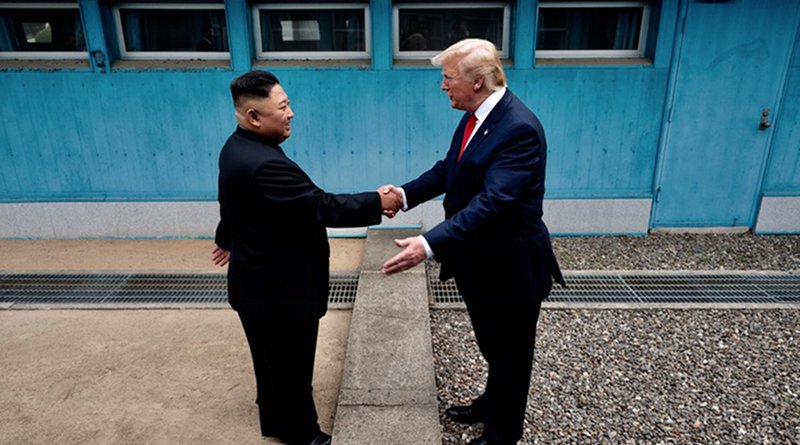US-North Korea Talks: Is Progress Without Reciprocity Possible? – Analysis
By IPCS
By Dr Sandip Kumar Mishra*
It is becoming obvious that unless the US provides some kind of security guarantee as well sanctions relief to North Korea, there will be no forward movement in US-North Korea denuclearisation talks. Despite open channels of communication between North Korean leader Kim Jong-un and US President Donald Trump, and North Korea’s recent offer to resume talks, Pyongyang has continued to conduct missile tests. Eight missile tests have taken place since July 2019, and the latest was on 10 September. There are three important indications from North Korea’s behaviour. One, it is willing to continue denuclearisation talks with the US. Two, it will not consider giving up the nuclear option until clear and concrete reciprocal actions are initiated by the US. Three, North Korea seeks a deal with the US as soon as possible.
The first indicator – of North Korea’s interest in talks – is evident in its recent posturing. Kim has been corresponding with Trump, he agreed to meet the latter at the DMZ at very short notice on 30 June 2019, avoids criticising him personally, and has limited recent missile testing to short-range missiles. At the same time, Kim’s disinclination to move ahead with the talks unless there are clear measures from the US in the form of sanction relief and a security guarantee is also evident. This is based on North Korea’s avoidance of official-level dialogue with the US on various pretexts, and the increasing frequency of its short-range missile tests.
North Korea is of the belief that its demands can only be fulfilled by dealing directly with Trump, and that any other US official, including Secretary of State Mike Pompeo and Special Representative for North Korea Stephen Biegun, do not have the capacity to facilitate them. So far, Trump has been unwilling to entertain North Korea’s stipulation of reciprocity, and insists on official dialogue to lock in the details of the denuclearisation process.
The issue of reciprocity was explicitly raised for the first time by North Korea in the second summit between the two leaders at Hanoi – a demand that abruptly aborted the summit. The US reportedly proposed a partial concession on sanctions but demanded North Korean dismantlement of its nuclear facilities at Yongbyon and beyond. North Korea made it clear that given limited trust between the US and North Korea, a gradual approach would be more appropriate.
Although North Korea was disappointed with the outcome – or lack thereof – of the Hanoi summit, it kept doors open for any indication of a change of mind by Trump. An expectation of a changed approach following Trump’s expression of interest in meeting Kim after the G-20 summit followed. However, this third meeting also did not result in a useful, or new, outcome. Despite these disappointments, North Korea agreed to start official-level dialogue with the US, although it is no longer willing to do so. It is evident that Kim has waited it out based on the expectation of a US policy of accommodation and flexibility which has yet to make itself visible. North Korea is also obdurate about its position, and the deadlock continues.
This game of waiting each other out appears to be taking the process nowhere and has instead resulted in a deadlock. The current circumstances are not as alarming for the US because North Korea has not conducted nuclear tests in some time, and the issue of the remains of US soldiers who lost their lives during the Korean War has been addressed. North Korea, however, wants a deal before the end of the year. This arises from North Korea’s belief that earning concessions from Trump, if played right, will be easier than another president, should he or she replace Trump.
It is also possible that Trump has realised the urgency of the issue drawing from the increasing frequency of missile tests, and the likelihood of a rapid deterioration in bonhomie. If a deal is not eventually forthcoming, North Korea may decide to conduct a nuclear or long-range missile test as escalation, and this would be ultimately detrimental to Trump’s election prospects as well. It is reported that National Security Advisor John Bolton, who was the most hawkish in Trump’s administration, was ousted (on the same day that North Korea conducted its last missile test), for this same reason.
In the coming days, the US could soften its stand in dealing with North Korea, and potentially adopt a principle of flexible reciprocity. It is important to underline however that Trump’s inconsistency in messaging could lead to any eventuality, and it is naive to assume that he will become suddenly more nuanced and visionary in approach after Bolton’s departure.
*Dr Sandip Kumar Mishra is Associate Professor, Centre for East Asian Studies, School of International Studies, JNU, & Visiting Fellow, IPCS

